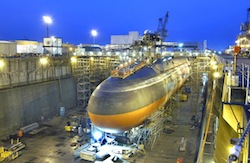New Nuclear Sub to Cost Up to $13 Billion
May 26, 2010
Featured Image
Today's top nuclear policy stories, with excerpts in bullet form.
Stories we're following today, Wednesday, May 26, 2010:
New Navy Sub May Cost $1 Billion More, CBO Says - Bloomberg [link]
- The Navy’s new nuclear-missile submarine could each cost about $8.2 billion, or almost 14 percent more than the Navy’s estimate of $7.2 billion, the Congressional Budget Office said.
- The first ship of the class -- typically the most expensive -- could run as high as $13 billion, or $4 billion over the Navy estimate, the nonpartisan agency said in a report released today.
- The new submarines are intended to replace the current Ohio-class fleet, the first of which deployed in 1981.
- Defense Secretary Robert Gates in a speech May 3 cited the new submarine’s expense as one example of cost increases that may prove unaffordable.
- “We have to ask whether the nation can really afford a Navy that relies on $7 billion submarines and $11 billion carriers,” Gates told the annual Navy League conference.
- “It is reasonable to wonder whether the nation is getting a commensurate increase in capability in exchange for these spiraling costs.”
Henry Kissinger: "Arms Control is Not a Bipartisan Issue, It is a Non-Partisan Issue" - Nukes of Hazard Blog [link]
- On Tuesday May 25, Former Secretary of State and National Security Advisor Henry Kissinger testified before the Senate Foreign Relations Committee on the New START Treaty, unequivocally recommending the treaty’s ratification.
- He referred to the New START Treaty as a continuation of decades of work by previous administrations and “a modest step forward.”
- Secretary Kissinger emphasized repeatedly that the consequences of non-ratification, saying that this would signal to both allies and enemies abroad a change in American polity and a new inclination to use of nuclear weapons.
Shocker: Senate GOP Wants to Slow Down START - Max Bergmann in The Wonk Room [link]
- Yesterday on the Senate floor, Sen. Jon Kyl went to the GOP’s go to play when they are losing the argument. Kyl called for the Senate to slow down.
- What this really demonstrates is the GOP has been forced to fall back and dust off their standard obstructionist ploy of complaining about process, resulting in calls for Congress to “start over” to “slow down” or to stop “rushing.”
- Ratifying New START therefore will give us greater insight into Russian nuclear forces and enhance nuclear stability. For the GOP Senators that have expressed concern over Russia’s nuclear arsenal, as Senator Kyl did, stalling and obstructing makes no sense.
- The fact is that four months is plenty of time for the Senate to read, review, and assess this treaty. Saying otherwise is just a call either for Senate laziness or political stalling.
NPT Conference Mulls Draft of Possible Measures - Agence France Presse [link]
- Israel and Iran would be expected to attend talks on making the Middle East free of nuclear weapons, according to a draft final document of a UN non-proliferation conference released Tuesday.
- The draft calls for an initial conference in 2012 "to be attended by all states of the Middle East, leading to the establishment of a Middle East zone free of nuclear weapons and all other weapons of mass destruction, on the basis of arrangements freely arrived at by the states in the region."
- Presented by conference president Libran Cabactulan, a top Filipino diplomat, the document is an effort to avoid conflict and speed up compromise, after two weeks of committee meetings failed to achieve consensus.
Clinton: Iran Nuclear Fuel Swap Offer is "Ploy" - The Associated Press [link]
- U.S. Secretary of State Hillary Rodham Clinton on Tuesday rejected as inadequate an Iranian plan to swap some of its enriched uranium for reactor fuel and called the offer a "transparent ploy" to try to avoid new U.N. Security Council sanctions over its suspect nuclear program.
- "There are a number of deficiencies with it that do not answer the concerns of the international community," Clinton told reporters [in Beijing.]
- For one, she noted that despite the offer Iran is insisting on continuing to enrich uranium at a high level.
- "There is a recognition on the part of the international community that the agreement that was reached in Tehran a week ago between Iran and Brazil and Turkey only occurred because the Security Council was on the brink of publicly releasing the text of the resolution that we have been negotiating for many weeks," Clinton said.



